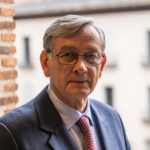This side event took place on the 5th fof November, 2015 . Click here to download the flyer (pdf) with more information about this event.
Other panelists included: Navid Hanif, Director, Office for ECOSOC Co-ordination and Support, UNDESA; Roberto Borrero, UN Programs Consultant, representing Indigenous peoples in the Major Groups for sustainable development; Lori Nessel, Professor of Law, specializing in migration issues, Seton Hall University or Ahmed Alhendawi, UN Secretary-General’s Envoy on Youth.
The speakers engaged in a timely discussion about the different aspects of development including social development within the Post-2015 Development Process towards the implementation of the new Sustainable Development on issues such as migration, youth, and indigenous groups. They expressed their ideas on the importance of equitability and dialogue with minorities and socially excluded groups and the creation of real partnerships going beyond the traditional conception of development beneficiaries. The impact on development of the feminization of migration, or measurement as a key instrument to achieve social inclusion were also among the issues discussed at the meeting.
Background to this session:
There is growing urgency about the future role of Social Development in the contemporary world and this is the priority theme of the Commission for Social Development. The Post-2015 Development Process has given the debate added impetus as the implementation of the new Sustainable Development will require a reorientation of all aspect of development including social development. Therefore the theme of the “Emerging issues” session for this year’ Commission for Social Development is the contribution of social development in the transition from the Millennium Development Goals to the Sustainable Development Goals.
This joint side event was convened immediately after the commemoration of the 20th anniversary of the World Summit for Social Development. The timing of this side event, which follows the high-level panel discussion on the priority theme “Rethinking and strengthening social development in the contemporary world” and before the panel discussion on the emerging issue, provided an opportunity to reflect on these themes and contribute ideas and perspectives to the emerging issues panel discussion.
A recurring theme in the Post-2015 debates has been the need for a holistic, integrated coherent and unified/universal approach, as can be seen in the reports of the Task Team, the Secretary General’s High Level Panel and the General Assembly Open Working Group on SDGs. It is likely to continue to be a theme through the final year of negotiations on the post-2015 development agenda and the subsequent implementation process.
A holistic approach to sustainable development, integrating social, economic and environmental dimensions, has been supported both by the Club de Madrid and the Division for Social Development, because it is predicated on an understanding that all aspects of development are inter-related and inter-dependent: progress on one aspect of development and on the SDGs is dependent on progress on the others.
The co-organisers of this event, the Shared Societies Project and the Division for Social Policy and Development of the United Nations Department of Economic and Social Affairs have worked profitably together to highlight the importance of a holistic and integrated approach to inclusive development, and have organised a number of related side events over the last three years
